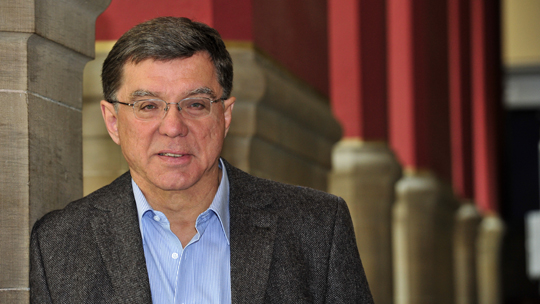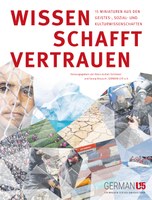Knowledge breeds trust
Freiburg, Jun 26, 2017
15 miniatures from the Humanities: The German U15, a grouping of 15 universities with a wide spectrum of subjects, long traditions, major medical schools, and world class research, has published a magazine, Wissen schafft Vertrauen. Professor of Modern and Contemporary History Ulrich Herbert, penned Freiburg’s contribution.

Source: German U15
“The humanities and social sciences and cultural disciplines are highly valued in Germany. The enable people to critically interpret the world and the changes in it, and to position themselves in it. In this way, they create social resistance to dangerous oversimplifications - as well as faith in the future of our society; particularly in the face of rising challenges from strengthening nationalism, from climate change, terrorism, even integration,” says Professor Hans-Jochen Schiewer, University of Freiburg Rector and chairman of the German U15.
The universities in the German U15 - Freiburg is one - see themselves as central players in this context, because they promote a large number and variety of humanities, social science and cultural disciplines - often in specialized “small subjects.” The U15 universities have published their magazine against this backdrop in this election year in Germany. Fifteen representatives of the humanities, social science and cultural disciplines have provided contributions based on their research, and give impetus for reasonable and constructive debate instead of fear-driven reactions.
Freiburg historian Ulrich Herbert wrote the following article.

Ulrich Herbert is Professor of Modern and Contemporary History at the University of Freiburg’s History Institute. Photo: Thomas Kunz
German Angst? It doesn’t exist!
Whenever there’s talk of “German Angst,” I’m skeptical. The term was used in the 1980s for a rather disaster-fearing attitude to issues like dying forests and rearmament. Fifteen years ago, when Germany had five million unemployed, there was certainly good reason to be fearful for the future. But today? In the past 130 years, Germans have never had it as good as they do now.
The irritations and fears - for instance, about millions of refugees who have come to Europe in recent years - are not restricted to Germany alone. On the contrary, the calm, wait-and-see attitude of most of the German population is very impressive. Compared to other countries, Germany is doing fairly well in the integration of new arrivals, in training and finding jobs for them - even though the German government rejected all notion of immigration until the late 1990s. But if you think that the problems of mass migration can be solved quickly somehow, you would be wrong. The current waves of immigrants are primarily an expression of the economic inequality between the rich northwest and the global south. And that is increasing; and so will the number of people on the move.
The greatest threat today is from ever-stronger nationalism. Strongly nationalist, radically right-wing and xenophobic movements have spread both in Europe and the US. They lead back to the political confrontations of the 1920s and 30s, whose catastrophic culmination appears to be slowly fading from the collective memory. The huge successes of European unity are today taken for granted; there is a clamor of complaint about errors and contradictions, and there is praise for nations seeking to go it alone. That is deeply concerning. Nationalism leads whole nations to perish.
Online edition of the magazine [only in German]
German U15 website
www.german-u15.de


